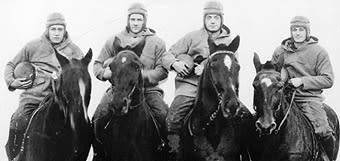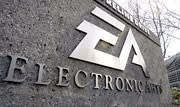Making NCAA pay?

Ed O'Bannon cuts net after beating Arkansas in '95 finals.
(USA/Allsport)
Last winter, Ed O'Bannon discovered that a couple of kids down the street didn't just know the star of the 1995 UCLA national championship team as a friend of their dad, a really tall neighbor or even as a guy who shows up on ESPN Classic every once in a while.
They knew O'Bannon – his tendencies, his number 31, even the mechanics of his lefty jump shot – from playing a video game that featured classic college teams.
"They literally played me on a video game," O'Bannon told Yahoo! Sports on Saturday. "You could play the '95 Bruins. It didn't have my name, but it had my number, left-handed, it looked like me. It was everything but the name.
"My friend kind of looked at me and said, 'you know what's sad about this whole thing? You're not getting paid for it.' I was just like, 'wow, you're right.' It just kind of weighed on me."
Fourteen years after O'Bannon left college, the NCAA, which profited handsomely off him as a student-athlete, was still profiting handsomely off him as a former student-athlete. They'd made a deal with EA Sports to feature that UCLA club. There were also O'Bannon jerseys, commemorative DVDs and full game footage still for sale.
O'Bannon, 36, now lives a comfortable life as a car salesman, husband and father of three in suburban Las Vegas. He was as troubled by the principle as the potential profits.
So he decided to do something about it.
Tuesday in federal court in San Francisco, O'Bannon became the lead plaintiff in a class action lawsuit on behalf of all current and former Division I-A football and men's basketball athletes against the NCAA. He's represented by two of the nation's most high-powered law firms – including one that secured reparations for Holocaust survivors from Swiss banks.
The complaint, obtained by Yahoo! Sports, alleges that the NCAA "has illegally deprived former student-athletes" from "myriad revenue streams" including DVDs, video games, memorabilia, photographs, television rebroadcasts and use in advertising.
At the crux of the battle is O'Bannon's assertion that he never gave the NCAA the right to do such a thing.
"There was no contractual or other granting of the right by a former student-athlete to the NCAA or any of the universities or conferences to capitalize on the use and licensing of former student-athlete's images," lead co-counsel Michael Hausfeld said Monday. "The NCAA is just exercising it anyway."
The NCAA responded to the suit via email Tuesday.
"We haven’t had an opportunity to review the lawsuit so we will defer comment at this time," NCAA spokesman Bob Williams said. "However, the NCAA categorically denies any infringement on former or current student-athlete likeness rights."
At stake is a share of the estimated $4 billion market for collegiate licensed merchandise, a business that has exploded over the past 15 years.
If the NCAA were to lose the case it would be forced to pay a substantial penalty. It'd also either have a growing revenue stream dry up or in a groundbreaking switch be forced to share it with former players (the way professional leagues do). Who the heck negotiates that on behalf of "former players" is a question unto itself. Either way, this isn't what schools, already dealing with sagging revenue due to the economy, needed.
It's a long time coming though.
The NCAA's ability to cash in on players in perpetuity has always been puzzling. Is there ever a statute of limitations? Shouldn't there eventually be grounds for compensation?
You can still buy official memorabilia of the Four Horseman of Notre Dame. Game jerseys of the 1966 Texas Western basketball team still sell even if the school changed its name 42 years ago. Bryce Drew's game-winning jump shot in the 1997 tournament remains in heavy rotation in commercials each March. Yet none of these people have seen a thin dime.

The Four Horsemen of Notre Dame on horseback. (L to R) Don Miller, Elmer Layden, Jim Crowley, and Harry Stuhldreher.
(AP Photo)
In the past the NCAA has defended the ability to profit off current student-athletes by citing so-called "scholarship papers," or "Form 08-3a" in NCAA jargon, that grant it. The lawsuit alleges the NCAA has simply extended that privilege into eternity.
While arguing the NCAA coerces uninformed students to sign that form, O'Bannon is not arguing for payment to current players.
"When you're in school you're obligated to live up to your scholarship," O'Bannon said. "But once you're done, you physically, as well as your likeness, should leave the university and the NCAA."
Hausfeld notes that the very forms the NCAA cites in controlling all revenue are for one-year terms. " [The scholarship] requires annual signing," he said. It's proof that the NCAA has no right over former athletes.
"What it does is emphasize the illegality with the Association essentially saying by reason of these annual, limited grants of right, the Association and the universities can exercise the right to use the image of the former student-athlete eternally," Hausfeld said.
"The entire program is focused on the student-athletes' enrollment in a university as well as the athletes' eligibility," he continued. "You've got two absolute qualifiers. You need to be a student and you need to be eligible. Once that ends, there are no rights the Association acquires over you."
The lawsuit cites myriad conflicts between NCAA practice and policy – such as EA Sports paying some former college stars such as Michael Crabtree and Kevin Love to appear on video game covers. There's another deal involving figurines in college uniforms and Tom Brady, Peyton Manning and others. The suit suggests that's proof that there is value to a player's likeness that should apply to all former student-athletes.
Hausfeld LLC has recovered billions in worldwide class action suits ranging from reparations from price fixing cartels to benefactors of slave labor.
His taking of the case along with Boies, Schiller & Flexner, which has been involved in mega-cases such as United States v. Microsoft and Bush v. Gore, suggests that the lawyers believe there is a great deal of punitive money available.
These aren't the kinds of firms that take on small or weak cases.
Hausfeld first became aware of the situation in March when he learned of a Howard University speech given by Sonny Vaccaro, the former sneaker executive and grass roots basketball architect. Vaccaro and Hausfeld spoke the next night for three hours. The attorney couldn't believe what he heard.
As his staff researched the case in the ensuing months, he said he'd often stop and rub his forehead in disbelief over what the NCAA was doing. He's stunned that no one had previously sued the NCAA on the former student-athlete issue.
Efforts against the NCAA on behalf of current athletes have mostly failed. This suit isn't touching that, which is why it's different.
"The NCAA and the universities have always defended their action by saying they were preserving the amateurism of the student-athlete as well as protecting the educational benefits that student-athlete receives by reason of their eligibility in participation of Division I athletics," he said.
"That totally disappears once that student-athlete is no longer a student-athlete. So what is it that's being protected? This is pure commercialization."
Vaccaro, who retired three years ago from a legendary and controversial career, said he's thrilled that lawyers of this stature are progressing on an issue he's been railing about for decades.
Vaccaro has long been a vocal advocate for player rights, even as his dealings at Nike, adidas and Reebok poured hundreds of millions into university coffers. In retirement he's proven to be even a greater antagonist to the NCAA, the untouchable private citizen with connections, credibility and the kind of energy that belies his 69 years of age. He's lobbied Congress, crisscrossed the country giving speeches and helped high school players skip college and play overseas.
He vows he will not receive a penny from this case.
"This is the greatest thing I've ever done," he said Monday. "This might be the first time I didn't do it for myself or a company I work for. I don't hate the NCAA. I can't overthrow the NCAA. All I've ever asked for is fairness for the kids. Just do the right thing."
When Hausfeld asked Vaccaro for the perfect lead plaintiff – a former athlete with the name and communication skills needed for a major undertaking – Vaccaro called O'Bannon. They've known each other since O'Bannon's high school days.
"When a man of his stature calls and wants you to help him get something accomplished, you have to do it," O'Bannon said. "I'm honored.

Electronic Arts headquarters in Redwood City, Calif. in 2008.
(Paul Sakuma/AP Photo)
" [Vaccaro] isn't what his enemies think he is," O'Bannon said. "People that just don't like him just don't understand. Athletes understand. Athletes can see his heart is in the right place. He's got the players' trust and with that trust he can accomplish the world."
For O'Bannon, joining the case required the convincing of his wife Rosa, a high school guidance counselor. While there is certainly money to be made, the family is doing fine and enjoying a tranquil existence these days. There's lots of Little League and quality time with their three children, a life far removed from O'Bannon's starring days at UCLA or his four-season run in professional basketball.
A potential two-year legal case that makes him a sort-of Curt Flood of college sports makes for an uncertain future. Rosa was against it, Ed persisted.
"It is my duty to make this happen," he said. "I'm in because I have an opportunity to open a door for a whole lot of student-athletes, former, present and future."
At long, long last perhaps, the NCAA may have to share some of its gold.
